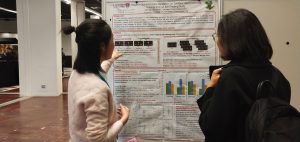In March 2019, lab members Marina Bazhydai, Priya Silverstein, and Shirly Ma presented their most recent work at the ICPS2019 (International Congress of Psychological Society) in Paris.
Priya held a symposium ‘What Can You Do with Nothing? Informative Null Results in Hard-to-Reach Populations’. Three talks in the symposium introduced the effective solutions when you get null results in your research. Priya give a talk titled ‘Theoretical and Methodological Implications of Null Results in Replication Studies’. 
A brief introduction of the symposium: In hard-to-reach populations, it is especially difficult and time consuming to collect data, resulting in smaller sample sizes and inconclusive results. Therefore it is particularly important to understand what null results can mean. We discuss results from our own experimental data and how meta-analyses and Bayes factors can increase informativeness.
Shirly presented a poster titled ‘Asymmetric Emotion Perception in Toddlers’ Word Learning: Evidence for a Negativity Bias‘
Poster description: we presented toddlers with a word learning task: an experimenter spoke in emotionally positive, negative or neutral tones. Eye tracking revealed that during training, toddlers looked more at neutrally labeled objects. At test, they showed retention of negatively and neutrally labeled objects. Perceived negative emotions influence learning novel word-object mappings.
